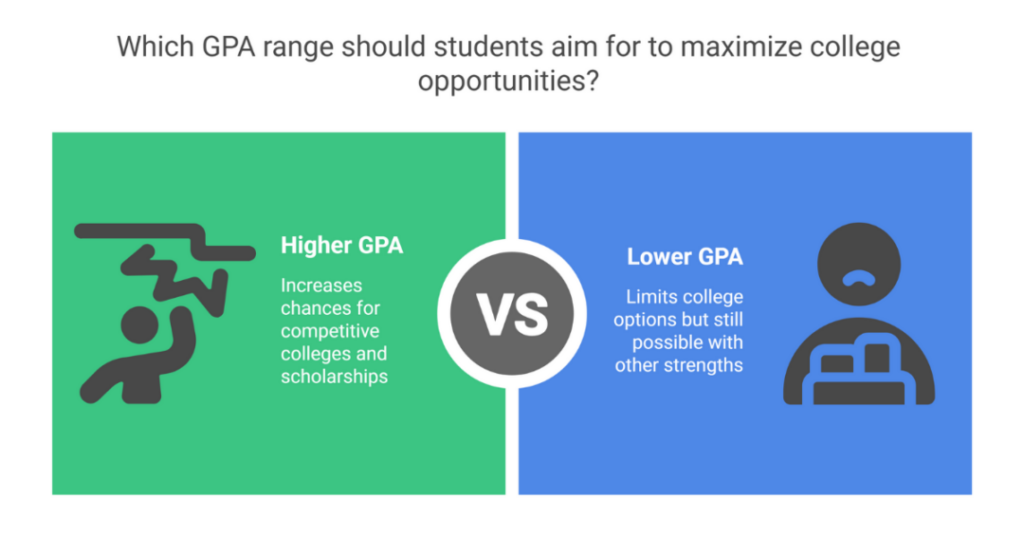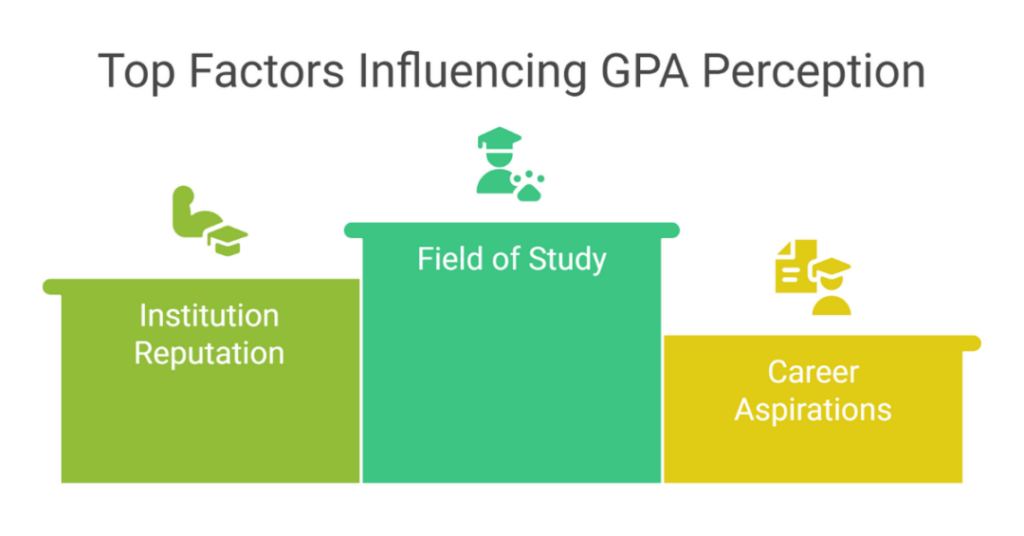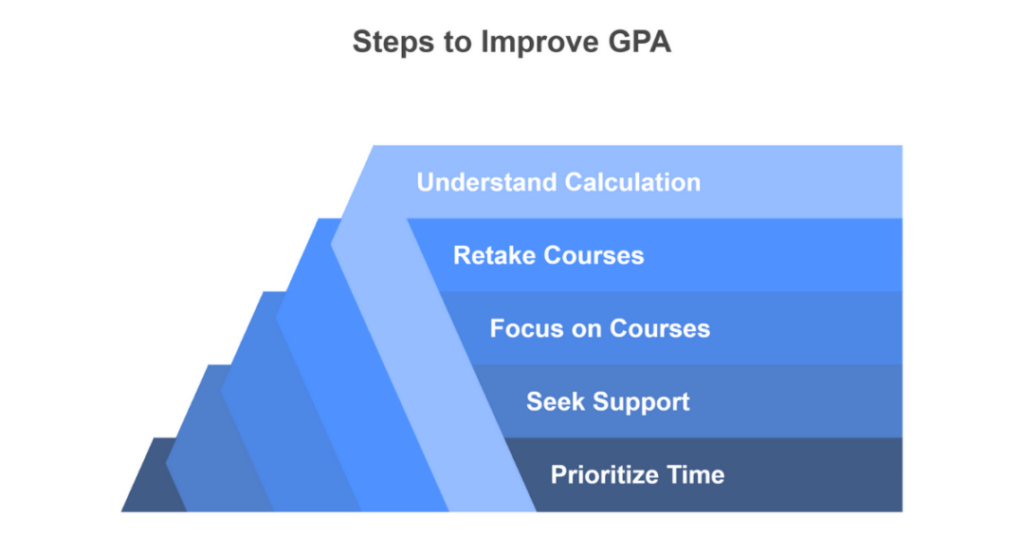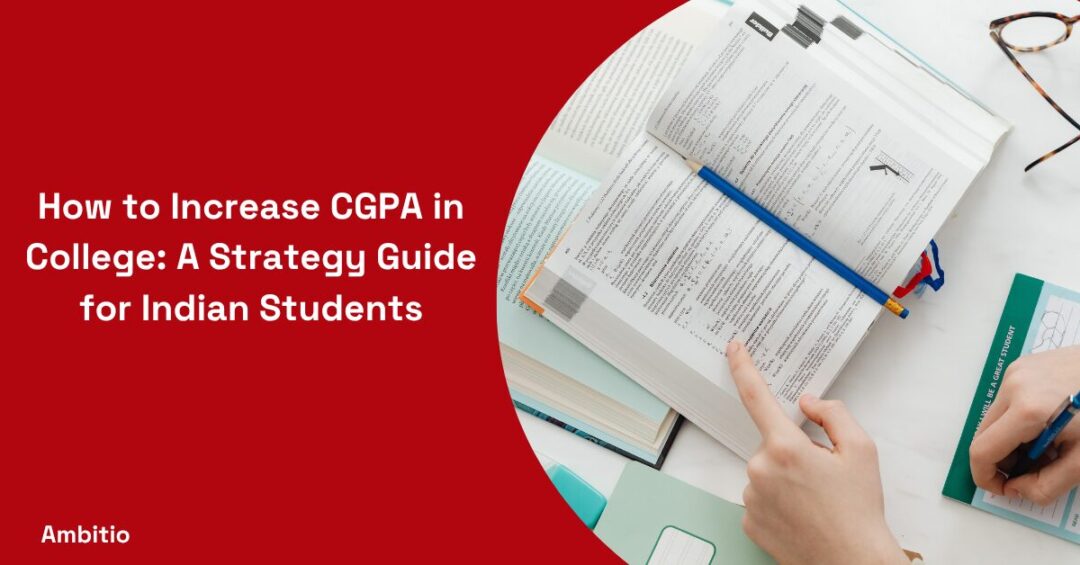27 June 2025
9 minutes read
What is a Good GPA for Bachelor’s Degree: Good GPA in College for Indian Students

Key Takeaways
- What is a good GPA for bachelor’s degree depends on your study destination, but a 3.0 to 3.5 on a 4.0 scale is generally considered competitive.
- What is a good GPA for bachelor’s degree when applying abroad typically means meeting the minimum university requirements and staying above average.
- What is a good GPA for bachelor’s degree varies by field, but higher GPAs improve your chances for scholarships, internships, and top-tier universities.
Are you aware that a GPA of 3.0 or better is generally regarded as “good” in most colleges? Nevertheless, the interpretation of a good GPA varies tremendously based on the major, college, and individual career aspirations.
This uncertainty might make many students unsure of their academic standing and how their GPA influences their career opportunities.
The truth is that students are frequently pressured to have good GPAs because they think it is the only way for them to succeed. While a good GPA can be a ticket to success, it is not the sole determinant.
In an experience-oriented and skills-focused world, students need to learn how to balance their academic achievement with real-world experience. This blog discusses what a good GPA is and how to navigate this challenging scenario.
What is a Good GPA in High School?
Having a satisfactory Grade Point Average (GPA) during high-school is important for college admissions, scholarships, and financial assistance.
A 3.0-GPA is a common target, but 3.5 or above can be an invaluable asset, especially when applying to more competitive colleges and merit-based financial aid. It is possible even with a lower GPA, such as a 2.0-GPA, that students will be able to obtain a college education, especially at community colleges or schools with less stringent admission criteria.

The worry with a low GPA tends to focus on its effect on opportunities at college and grad school. A higher GPA is always better, but it’s not everything colleges look at. Colleges may also look for extracurricular activities, personal statements, and recommendations.
This wider consideration allows students with a minimum GPA or borderline, such as a 3.0-GPA, to show their ability outside of academics. The key is to balance academic performance with experiences that showcase unique strengths and interests. When it comes to higher education, you can seek the help of a GPA calculator for MS in USA.
What is a Good GPA for Undergraduate Degree?
A solid high-school GPA can lay the groundwork for a successful college application process, but what does it mean to have a good GPA for an undergraduate degree? In general, a 3.0-GPA or better is regarded as a good benchmark, with most elite colleges boasting a median GPA of approximately 3.28 among admitted students.
Yet, obtaining a GPA of 3.69 or above can greatly enhance opportunities, especially for students who wish to graduate college with honors academically or go on to a graduate program.
A high GPA may open doors, but keeping it throughout your college years is important. The GPA incorporates both cumulative and major GPAs, indicating your overall performance in college and in certain fields of study.
Most online GPA calculators can assist with tracking your progress and goal setting, whether you’re trying for a minimum 3.5 GPA or a maximum possible GPA. Just remember, a lower GPA is not the end of everything; it is possible to improve your GPA with consistent effort and planning, and it can be a significant component of your college experience.
What Is The Difference between Cumulative GPA and Average GPA
Understanding the distinction between CGPA and average GPA is crucial for both high-school and college applicants. The CGPA represents the overall Grade Point Average for all courses taken throughout your academic career.
This includes every class from your first year to your last, providing a comprehensive view of your academic performance. Conversely, the average GPA usually means the GPA over a definite range, e.g., semester or year. Calculating a cumulative GPA is also different from calculating average GPA.
A high-school GPA usually is a key element in admissions, fulfilling the GPA requirement for universities. To study in institutions, having a high GPA, including an excellent GPA, is an integral part of your academic life.
Good GPA can also make your resume stand out, making you a better candidate for internships, scholarships, and job opportunities.
A B average or lower GPA will not close doors, but it will certainly narrow down opportunities, particularly if you’re eyeing programs that have high GPA requirements. There even exists a 20 point GPA which certain universities use for their academic evaluation.
Though a high GPA is a significant component of the study experience, it isn’t everything. A solid academic record can also speak to discipline and commitment.
That being said, it’s crucial to note that a GPA, either cumulative or average, is only one component of your entire profile. The integration of academics with extracurricular activities, leadership positions, and self-improvement is central to a balanced college experience.
How to Calculate your GPA
Calculating your 4.0 GPA is an easy process that may assist you in monitoring your academic progress.
Begin with a list of the GPA for every course you have taken. This would include grades translated into a uniform 4.0 system, with an A being 4.0 and a B being 3.0 and so forth.
Each course would normally have some amount of credit hours. Write down the number of credit hours beside each course grade.

Multiply each course’s GPA by the credit hours to obtain the quality points. If you got an A (4.0 GPA) in a 3-credit hour course, you would have 12 quality points. Sum all the quality points and the total credit hours.
Divide the total quality points by the total credit hours to arrive at your CGPA. For instance, the median GPA for college students is around 3.28 on a 4.0 scale, indicating good academic standing.
A good GPA may vary depending on the institution and program, but maintaining a GPA around this median can be a strong foundation for your college studies.
Remember, achieving a good GPA is important, but balancing it with a well-rounded college experience is key. There are also GPA to CGPA converters available which is used by colleges for various purposes.
Fun Fact: Universities including the University of Oxford, University of Cambridge, Yale University, McGill University, Carnegie Mellon University, UC Berkeley, Stanford University, MIT, University of Pennsylvania, University of Michigan, Caltech, University of Texas at Austin, etc. give great importance to test scores like IELTS, TOEFL, GRE, GMAT, SAT and ACT.
Let’s compute a sample GPA of a student through the steps given. Let’s say the courses and grades of a student are as follows:
- Mathematics: A (4.0 GPA), 3 credit hours
- English: B (3.0 GPA), 4 credit hours
- History: A- (3.7 GPA), 3 credit hours
- Biology: B+ (3.3 GPA), 2 credit hours
Now, list your GPA for each course and assign credit hours
| Course | Grade | GPA | Credit Hours |
|---|---|---|---|
| Mathematics | A | 4.0 | 3 |
| English | B | 3.0 | 4 |
| History | A- | 3.7 | 3 |
| Biology | B+ | 3.3 | 2 |
Let us now calculate the quality points:
- Mathematics: 4.0 GPA * 3 credit hours = 12 quality points
- English: 3.0 GPA * 4 credit hours = 12 quality points
- History: 3.7 GPA * 3 credit hours = 11.1 quality points
- Biology: 3.3 GPA * 2 credit hours = 6.6 quality points
Total Quality Points and Credit Hours
- Total Quality Points = 12 + 12 + 11.1 + 6.6 = 41.7
- Total Credit Hours = 3 + 4 + 3 + 2 = 12
Divide to Find Your GPA
- Cumulative GPA = Total Quality Points / Total Credit Hours
- Cumulative GPA = 41.7 / 12 ≈ 3.48
This GPA calculation indicates a CGPA of around 3.48, which is higher than the median GPA for college students (3.28) and is good academic standing on a 4.0 scale.
Factors That Affect What’s Considered a Good GPA
What constitutes a good college GPA is not always clear, it varies by your discipline, institution, and career aspirations. Across STEM and humanities, Ivy League and state schools, and academia and business careers, expectations are more diverse than you imagine.
Field of Study: STEM vs. Humanities
GPA requirements range as much as the majors. STEM majors typically get graded more severely, so a 3.2–3.5 GPA would be good. Humanities students may shoot for 3.6 and up in order to remain competitive. Because GPA differs by major, what might be low in one major is high in another.
GPA Expectations: US vs. Other Countries
In America, a satisfactory college GPA based on the 4.0 GPA scale is usually over 3.0, and the mean GPA for four-year college students is approximately 3.28. GPA scoring, though, varies around the world, so calculating GPA based on destination country requirements is necessary. A GPA of 3.7 or better in the U.S. is usually indicative of excellent college performance.
Ivy League vs. State Schools
GPA will be weighed differently based on the reputation of your college or university. Being a 3.6 GPA college graduate from a demanding Ivy League may take precedence over a 4.0 GPA from a less demanding institution. Employers tend to consider where you graduated with your GPA, rather than the number.

Academia, Corporate, and Government Benchmarks
To go into academia or research, you generally require a GPA of 3.5 or better. A good college GPA is a plus, especially for new graduates, in corporate industries—but experience tends to trump it. For government jobs or scholarships, you may require a GPA of 2.0 GPA or better at least. GPAs in college tend to be a benchmark but are seldom the only consideration.
Beyond Numbers: What Else Matters?
Though your overall GPA is important, so is the way you make it look. Jack up your GPA whenever you can, and feature it strategically—like a 3.8 GPA on a resume.
When your GPA isn’t great, play up scholarship awards, academic achievement, college athletics and academic involvement, or leadership positions. You don’t always require a flawless GPA—but you do need to attain the GPA for which you aim.
Quick Stats
- Average high school GPA: ~3.0
- Average college GPA: 3.28
- GPA for students varies based on major, school, and country
- A 3.7 GPA or higher is typically considered excellent
- Most colleges require at least a 2.0 GPA to graduate
Reasons Why a Good GPA in College is Important
Maintaining a good GPA in college is not just about meeting academic requirements; it plays a vital role in shaping future opportunities and personal development.
Academic Standing and Honors
Maintaining a good GPA is crucial for staying in good academic standing. Many universities and colleges require a minimum GPA of 3.0 or higher for students to avoid academic probation. Achieving at least a 3.5 GPA can also qualify students for honors distinctions, which can be a significant achievement on a resume.
Graduate School and Career Opportunities
A strong GPA is often a requirement for admission into competitive graduate programs. Many graduate schools require a minimum GPA for entry, and a high GPA can improve chances of acceptance. Additionally, some employers use CGPA as a metric during the hiring process, especially for recent graduates. A good GPA can indicate strong work ethic and mastery of subject matter.
Scholarships and Financial Aid
Many scholarships and financial aid packages have a required GPA to maintain eligibility. This GPA is often calculated each semester, and students must consistently meet this threshold to continue receiving financial support. Maintaining a good GPA can also open doors to additional scholarships and grants, reducing the financial burden of higher education.
Skill and Discipline Development
The process of achieving a good GPA involves developing skills like time management, discipline, and critical thinking. These skills are valuable beyond the classroom, helping students succeed in various aspects of life.
Whether a GPA is good enough often depends on the field of study and individual goals, but the effort to maintain a high GPA and CGPA is beneficial in building a strong academic and professional foundation.
Ways to Improve your GPA in College
Improving your GPA in college requires a strategic approach and consistent effort. Whether your GPA is good but could be better, or you’re starting from a lower point, there are effective ways to boost your academic performance.
Prioritize Time Management
Good time management helps you balance coursework, study time, and extracurricular activities. Planning your schedule and setting clear priorities can significantly impact your cumulative GPA.
Seek Academic Support
Utilize resources like tutoring centers, study groups, and office hours with professors. These can provide additional help in difficult subjects, especially if your GPA needs a boost in specific areas.
Focus on High-Impact Courses
Pay extra attention to courses that carry more credit hours or are weighted more heavily in your major. Since cumulative GPA covers all courses, focusing on these high-impact classes can improve your GPA more quickly.
Retake Courses
If possible, retake courses in which you received lower grades. Many colleges allow grade replacement or improvement in the calculation of your cumulative GPA. This can be particularly beneficial if those courses were major requirements.

Understand Your GPA Calculation
Knowing whether your GPA is unweighted or weighted can help you strategize. For instance, in an unweighted GPA system, each course contributes equally, whereas weighted systems might give more credit to advanced or honors courses. A high GPA can make a significant difference in academic and professional opportunities, so understanding how your GPA is calculated is crucial.
Conclusion
Improving and maintaining a good GPA in college is more than just a number—it’s a reflection of your dedication, discipline, and ability to overcome challenges. Whether your cumulative GPA covers a strong academic foundation or needs improvement, focusing on effective strategies can make a significant difference.
A high GPA can open doors to graduate programs, scholarships, and career opportunities, demonstrating your commitment to academic and professional excellence. Remember, your GPA is just one part of your journey; balancing academics with personal growth and experiences is key to a fulfilling college experience.
Navigate your path to academic triumph with Ambitio Elite. Our bespoke assistance, fueled by AI and mentorship, guarantees admission success. Embark on your journey now! Discover Ambitio Elite
FAQs
What is a good GPA for bachelor’s degree to study abroad?
When considering international education, what is a good GPA for bachelor’s degree often ranges from 3.0 to 3.5 on a 4.0 scale. Understanding what is a good GPA for bachelor’s degree helps meet global university standards.
What is a good GPA for bachelor’s degree to qualify for scholarships?
To be eligible for most scholarships, what is a good GPA for bachelor’s degree is usually 3.5 or higher. Knowing what is a good GPA for bachelor’s degree gives you an edge in competitive funding programs.
What is a good GPA for bachelor’s degree in the U.S. system?
In the U.S., what is a good GPA for bachelor’s degree typically means at least a 3.0 GPA. This benchmark answers what is a good GPA for bachelor’s degree needed for graduate programs or jobs.
What is a good GPA for bachelor’s degree for Ivy League admissions?
For U.S. graduate programs, what is a good GPA for bachelor’s degree starts at 3.0, but higher is always better. Different departments have varied opinions on what is a good GPA for bachelor’s degree, especially in competitive fields. Make sure you meet what is a good GPA for bachelor’s degree requirements published by each university.
What is a good GPA for bachelor’s degree in technical fields like engineering?
In technical programs like engineering, what is a good GPA for bachelor’s degree is at least 3.2. Many employers and grad schools ask specifically what is a good GPA for bachelor’s degree when shortlisting candidates. Keep track of what is a good GPA for bachelor’s degree in your target industries or institutions.
What is a good GPA for bachelor’s degree when applying for a master’s program?
To secure quality internships, what is a good GPA for bachelor’s degree should be around 3.0 or above. HR professionals often filter applicants based on what is a good GPA for bachelor’s degree to assess consistency. Make sure your resume highlights what is a good GPA for bachelor’s degree as per industry expectations.
What is a good GPA for bachelor’s degree if aiming for research positions?
For research and academic roles, what is a good GPA for bachelor’s degree is typically 3.5 or higher. Academic mentors frequently guide students on what is a good GPA for bachelor’s degree for future PhD programs. Knowing what is a good GPA for bachelor’s degree can shape your research opportunities globally.

You can study at top universities worldwide!
Get expert tips and tricks to get into top universities with a free expert session.
Book Your Free 30-Minute Session Now! Book a call now




























